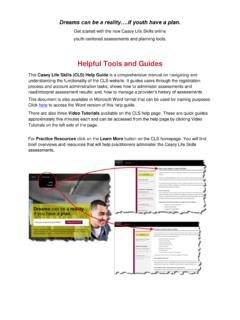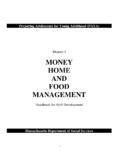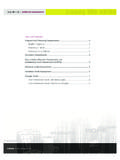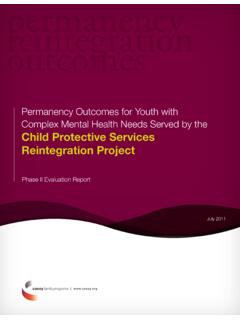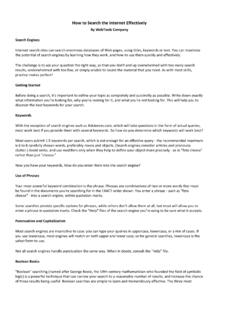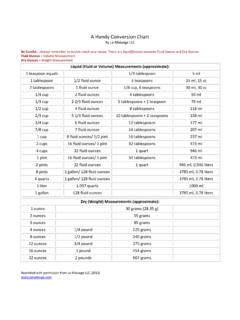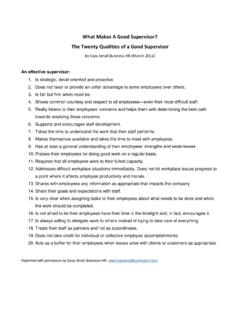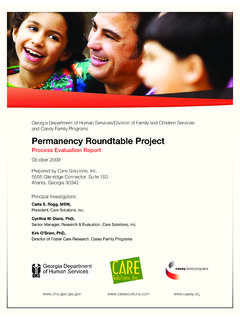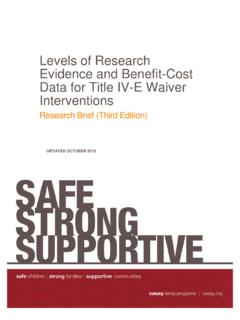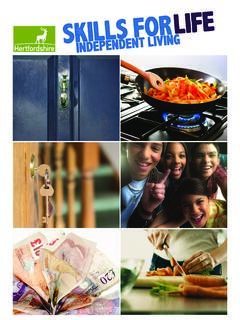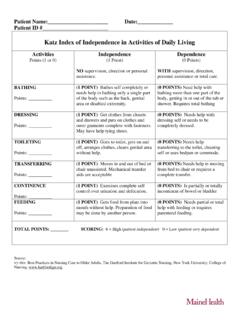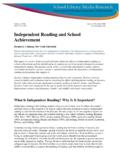Transcription of practice guide - Casey Family Programs
1 Casey life skillscasey Family programscasey life skills | practice guidePractitioners GuideThis practice guide gives users a quick overview of how to use the Casey Life Skills website to assess youth s knowledge, skills and abilities. It includes a high level look at the skill areas assessed in the Casey Life Skills Assessment (CLSA), information about the importance of permanent connections for older youth and a listing of other assessments available. It outlines a six-step framework for how to administer an assessment, determine a youth s strengths and challenges through a meaningful conversation, build an effective learning plan and help a youth gain useful life skills.
2 If you have questions about CLSA, please contact the Casey Life Skills Assessment Team at have you acquired life skills?If you re like most adults, you ve learned the most through experience. Classes can provide information and exposure on the cognitive level, but youth need the real world experience of managing money, preparing food, preparing for a job interview, making a dental or medical appointment, or opening a bank account to fully develop these Youth need to internalize and personalize what they have learned and develop confidence about using the skill in the is the Casey Life Skills Assessment (CLSA)?
3 The CLSA is: A free, online youth-centered tool that assesses life skills youth need for their well-being, confidence and safety as they navigate high school, postsecondary education, employment and other life milestones. A measure of youth confidence in their future and their permanent connections to caring adults. Designed to be as free as possible from gender, ethnic and cultural biases. Appropriate for all youth ages 14 to 21 regardless of living circumstances ( , in foster care, with bio-parents, in group homes or other places). Comprehensive with 113 assessment items categorized within eight areas for skills, knowledge and awareness.
4 Youth can complete one area at a time or finish the whole assessment in approximately 30-40 CLSA is not a test! It is a self-reporting instrument that gives youth and their caregivers the opportunity to assess their strengths and challenges. It promotes young people s active engagement in planning their learning goals and making decisions (within the safety of adult mentoring) about their Smith, (2011). Youth Leaving Foster Care: A Developmental, Relationship-Based Approach to practice . New York: Oxford University life skillscasey Family programscasey life skills | practice guide The CLSA was designed for use with youth in foster care but can be useful for other youth involved in juvenile justice facilities, employment centers, homeless shelters or with other social service providers.
5 The CLSA does not collect personal identification information and the results are kept anonymous in a secure database. The tool may help states meet the transition requirements of the Fostering Connections to Success and Increasing Adoptions Act. Fostering Connections requires that older youth in foster care be better prepared for adulthood and provides federal support for transition Programs to age 21. The CLSA can also be a support tool for states Chafee Foster Care Independence Programs . These Programs deliver instruction and services for young people in areas such as obtaining a high school diploma or GED, career exploration, job placement, daily living skills, money management and preventive health education, etc.
6 Check with your state s independent living Coordinator to get more information on the Chafee benefits for which youth in care may be eligible ( , Education and Training Vouchers). Areas Are Assessed in the CLSA?Life SkillsNumber of ItemsCompetencies AssessedDaily Living17 Meal planning and preparation, cleaning and food storage, home maintenance and computer and internet Care17 Healthy physical and emotional development such as personal hygiene, taking care of one s health and pregnancy and Communication18 Developing and sustaining healthy relationships, cultural competency and permanent connections with caring life skillscasey Family programscasey life skills | practice guideLife SkillsNumber of ItemsCompetencies AssessedHousing and Money Management23 Banking and credit.
7 Finding and keeping affordable housing, budgeting and living within one s and Study 20 Basics of employment, legal issues, study skills and time management. Career and Education Planning9 Planning for career and postsecondary education pertinent to older youth. Looking Forward8 Youth s level of confidence and internal feelings important to their within all of the skill areas of the assessment are 20 items that assess a youth s connection to trusted adults, community of support and overall interdependent connections. It is recommended that practitioners pay attention to these areas as young people need a strong safety net of support as they learn the skills they need to move to young preview the Casey Life Skills Assessment click here and go to page does the CLSA emphasize permanency?
8 Youth tell us, and Casey Family Programs believes it is best practice that every youth needs and deserves to grow up in a safe and permanent Family as well as a supportive community. Ideally, all youth who experience foster care will attain legal permanency, in which the youth is reunified with his or her biological parents, is adopted or lives with a legal guardian. Regardless of the achievement of legal permanency, ensuring that youth establish permanent connections is essential to help them prepare for and succeed in adulthood. A permanent connection is a stable, lasting, unconditional, emotional and relational connection that one has with Family members and significant others in their lives, whether or not the youth resides with them.
9 When youth have trusting connections with adults who care about them and their success, this gives them optimism and encouragement that they can grow and learn. When youth transition from the assistance provided by Programs and services, permanent relationships continue and provide support. Casey life skillscasey Family programscasey life skills | practice guideA young person s permanent connections are assessed throughout the CLSA. In addition to assessing knowledge, skills and ability to access community resources, each skill area has one or more statements to help determine if youth have trusted adults with whom they are actively engaged in an enduring relationship.
10 For example, in the area of relationships, there is I know at least one adult I can depend on when I exit care. In Housing and Money Management there is I know an adult I could live with for a few days or weeks if I needed to. Practitioners can use the CLSA to assess whether or not youth have a safety net of support underlying all the skill areas. It is essential for those who work with young people to help them establish meaningful lifelong connections with Family members and other significant adults who will support them as they prepare for adulthood and beyond. This work is an essential part of each youth s learning or service more information about foster care and permanency, please visit the Casey Family Programs website at An additional tool to help youth develop a network of caring people is FosterClub s Permanency Pact.
